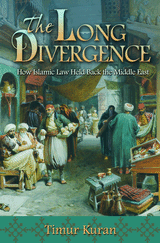 A colleague
noted that Timur Kuran’s ‘Why the Middle East is Economically Underdeveloped: Historical Mechanisms of Institutional Stagnation’ might be of interest. On SSRN, its abstract
reads:
A colleague
noted that Timur Kuran’s ‘Why the Middle East is Economically Underdeveloped: Historical Mechanisms of Institutional Stagnation’ might be of interest. On SSRN, its abstract
reads:
Although a
millennium ago the Middle East was not an economic laggard, by the 18th century
it exhibited clear signs of economic backwardness. The reason for this transformation
is that certain components of the region's legal infrastructure stagnated as
their Western counterparts gave way to the modern economy. Among the institutions
that generated evolutionary bottlenecks are the Islamic law of inheritance,
which inhibited capital accumulation; the absence in Islamic law of the concept
of a corporation and the consequent weaknesses of civil society; and the waqf,
which locked vast resources into unproductive organizations for the delivery of
social services. All of these obstacles to economic development were largely
overcome through radical reforms initiated in the nineteenth century. Nevertheless,
traditional Islamic law remains a factor in the Middle East's ongoing economic
disappointments. The weakness of the region's private economic sectors and its
human capital deficiency stand among the lasting consequences of traditional
Islamic law.
He noted, too, Kuran’s The Long Divergence: How Islamic Law Held Back the Middle East (2010) and
a related video.

No comments:
Post a Comment